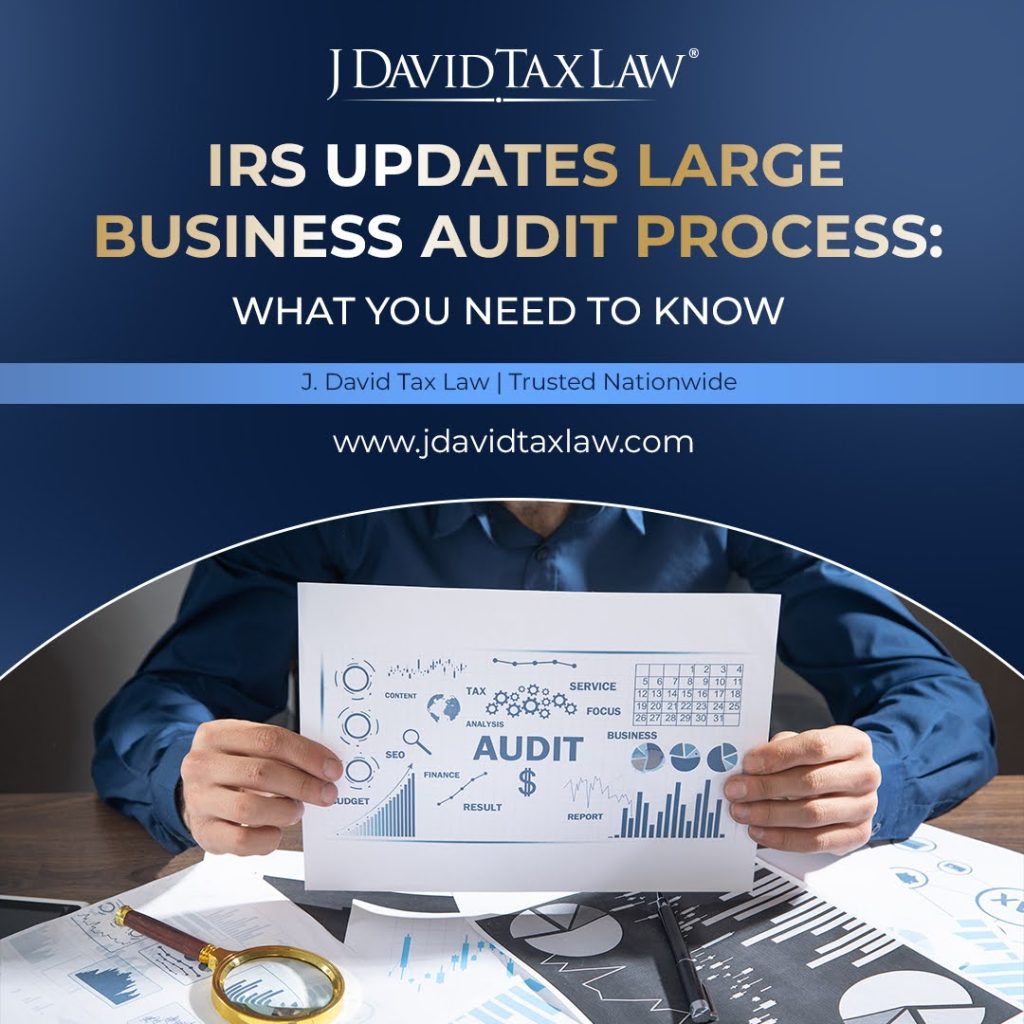Dealing with an IRS audit can be an overwhelming experience, especially for those unfamiliar with the complexities of tax law. While some taxpayers might attempt to handle an audit on their own, it’s often in their best interest to seek the guidance of a seasoned tax lawyer.
The stakes are high when you are facing a tax audit. Your finances, your peace of mind, and perhaps even your reputation are on the line. J. David Tax Law is one of the leading law firms that you can find to help you. The Firm possesses not only the legal expertise needed to manage your case but also the experience in IRS negotiations.
Understanding IRS Audits
Facing an IRS audit can be a stressful experience, particularly if you don’t understand how the process works. By understanding the types of audits and what can trigger them, you can better prepare yourself and avoid the common pitfalls that may lead to these stressful situations.
Types of IRS Audits
1. Correspondence Audits:
This is the most common type of audit, where the IRS sends a letter to the taxpayer requesting additional information or clarification about specific items on their tax return. Usually, these audits focus on a single issue, such as unreported income or mismatched information, and can often be resolved by mailing in the requested documentation.
2. Office Audits:
These audits require the taxpayer to visit a local IRS office and meet with an auditor. Office audits are more comprehensive than correspondence audits and typically involve a detailed review of the taxpayer’s records. The auditor may ask for clarification on multiple aspects of the tax return, such as income sources, deductions, and credits.
3. Field Audits:
Field audits are the most comprehensive and intrusive type of IRS audit. Here, the IRS auditor visits the taxpayer’s home or business to conduct a thorough examination of the financial records. Field audits often occur when the IRS suspects significant discrepancies or when complex business transactions require a closer inspection.
Common Reasons for Audits
1. Discrepancies in Reported Income:
One of the most common triggers for an IRS audit is a mismatch between the income reported on tax returns and what third-party entities report. If your employer or other payers report a different income amount than what you declare, it raises a red flag.
2. Excessive Deductions:
Claiming unusually high deductions compared to your income level can also trigger an audit. The IRS uses computer algorithms to identify returns with deductions that deviate significantly from the average for similar taxpayers, such as unusually high charitable contributions or business expenses.
3. Offshore Accounts:
The IRS pays close attention to taxpayers with offshore accounts and assets. If you fail to report these correctly, it could lead to a comprehensive audit, especially given the IRS’s focus on uncovering tax evasion related to offshore holdings.
4. Large Cash Transactions:
Significant cash transactions, such as large deposits or withdrawals, can catch the attention of the IRS. This is especially true if such transactions are not reported on your tax return or do not align with your reported income.
Understanding these types of audits and their purpose can help you prepare and take preventive measures to avoid issues with the IRS. If you do find yourself facing an audit, it’s crucial to have a tax professional from J. David Tax Law on your side. Your tax lawyers can guide you through the process and protect your interests.
The Process of Engaging a Tax Attorney
When faced with an IRS audit, engaging a tax lawyer from J. David Tax Law can be a crucial step toward achieving a favorable resolution. Here’s what the process typically involves:
Initial Consultation
The first step in engaging a tax lawyer is an initial consultation. During this meeting, the taxpayer and the tax professional discuss the details of the case, including the type of audit, the issues being raised by the IRS, and the taxpayer’s financial situation.
The tax professional assesses the complexity of the case and explains how they can assist, outlining the potential steps and strategies involved. This is also an opportunity for the taxpayer to ask questions and gain a clear understanding of what to expect throughout the audit process.
Fee Structure
Tax lawyers typically have various fee structures, including hourly rates, flat fees, or contingency fees. The taxpayer needs to understand these structures and choose a lawyer whose fee arrangement aligns with their budget and the complexity of their case.
Hourly rates are common for audits, as the time required can vary greatly. Flat fees may apply for specific services, such as representing a client in a single meeting. The right choice depends on the taxpayer’s specific needs and the complexity of the audit.
Documentation and Case Review
A thorough review of the taxpayer’s financial documents is crucial for building a solid defense. The tax lawyer will request relevant documentation, including tax returns, financial statements, and correspondence with the IRS.
Organizing these documents and presenting them is essential, as it provides the lawyer with the information needed to assess the case fully. This review helps identify the audit’s focal points, any discrepancies that need to be clarified, and potential strategies for resolving the issues.
Benefits of Hiring a Tax Lawyer
Peace of Mind
The reassurance that comes with having a seasoned tax lawyer handle an IRS audit cannot be overstated. Tax attorneys from J. David Tax Law know the intricacies of IRS regulations and procedures. Their involvement allows taxpayers to focus on other priorities while knowing their case is in capable hands. The firm’s decades of combined experience can prevent costly mistakes and alleviate the stress associated with handling a complex and high-stakes situation.
Reduced IRS Penalties
A tax lawyer’s expertise can be pivotal in negotiating with the IRS to reduce penalties and reach settlements. They are skilled in identifying grounds for reducing or eliminating penalties, such as reasonable cause arguments or procedural issues.
In cases where taxpayers owe back taxes or face penalties, a lawyer from J. David Tax Law can often negotiate an offer in compromise or an installment agreement that mitigates the financial burden.
Future Compliance
J. David Tax Law doesn’t just help with resolving current issues; it also guides clients in avoiding future problems. The firm can provide advice on compliance with IRS regulations to prevent future audits. This proactive approach helps taxpayers understand and follow the complex tax laws that apply to them, reducing the likelihood of future discrepancies.
Overall, the value of engaging a tax attorney from J. David Tax Law during an IRS audit is highly recommended. From the initial consultation to case resolution, they provide expertise, representation, and peace of mind. The firm is helping taxpayers face the complex world of tax law with confidence.
Conclusion
Each audit is unique, and a tax lawyer’s experience allows them to tailor strategies to the specific needs of the case. This may involve organizing and presenting documentation in a way that strengthens the taxpayer’s position, identifying possible weaknesses in the IRS’s arguments, and exploring alternative interpretations of tax law that may benefit the taxpayer.
In more complex cases, where the IRS is scrutinizing several years of returns or where significant penalties are at stake, a well-crafted legal strategy can be the difference between a successful resolution and severe financial consequences.
Don’t wait until the IRS escalates the issue—contact J. David Tax Law today to ensure you have the best possible defense for your situation.




















